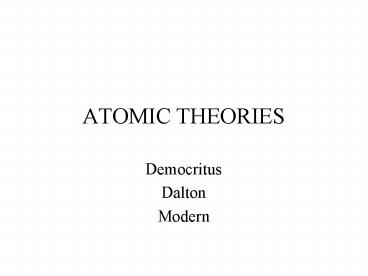ATOMIC THEORIES - PowerPoint PPT Presentation
Title:
ATOMIC THEORIES
Description:
Title: ATOMIC THEORIES Author: Gregory Wieland Last modified by: Greg Wieland Created Date: 10/2/2006 9:42:10 PM Document presentation format: On-screen Show (4:3) – PowerPoint PPT presentation
Number of Views:212
Avg rating:3.0/5.0
Title: ATOMIC THEORIES
1
ATOMIC THEORIES
- Democritus
- Dalton
- Modern
2
1st Atomic Theory
3
1st Atomic Theory
- Democritus
- (Greek 400 B.C.)
4
1st Atomic Theory
- Democritus
- (Greek 400 B.C.)
- Matter is made of tiny particles, atoms.
5
1st Atomic Theory
- Democritus
- (400 b.c.)
- Matter is made of tiny particles, atoms.
- Different types of atoms exist for every type of
matter.
6
1st Atomic Theory based on Science
7
1st Atomic Theory based on Science
- John Dalton (English 1803)
8
1st Atomic Theory based on Science
- John Dalton (English 1803)
- All matter is made of indivisible atoms.
9
1st Atomic Theory based on Science
- John Dalton (English 1803)
- All matter is made of indivisible atoms.
- All atoms of an element are alike.
10
1st Atomic Theory based on Science
- John Dalton (English 1803)
- All matter is made of indivisible atoms.
- All atoms of an element are alike.
- Atoms of different elements are different.
11
1st Atomic Theory based on Science
- John Dalton (English 1803)
- All mater is made of indivisible atoms.
- All atoms of an element are alike.
- Atoms of different elements are different.
- Compounds form when atoms bond.
12
1st Atomic Theory based on Science
- John Dalton (English 1803)
- All mater is made of indivisible atoms.
- All atoms of an element are alike.
- Atoms of different elements are different.
- Compounds form when atoms bond.
- In a given compound, the number and kind of atoms
is constant.
13
Modern Atomic Theory
14
Modern Atomic Theory
- Atoms ARE divisible they are made of subatomic
particles
15
Modern Atomic Theory
- Atoms ARE divisible they are made of subatomic
particles - protons and neutrons in a nucleus surrounded by
16
Modern Atomic Theory
- Atoms ARE divisible they are made of subatomic
particles - protons and neutrons in a nucleus surrounded by
- electrons in an electron cloud
17
Modern Atomic Theory
- Atoms ARE divisible they are made of subatomic
particles - protons and neutrons in a nucleus surrounded by
- electrons in an electron cloud
- Number of neutrons can vary, creating isotopes.
18
Modern Atomic Theory
- Contributors to the modern atomic theory
- Democritus - first atomic theory
19
Modern Atomic Theory
- Contributors to the modern atomic theory
- Democritus
- Lavosier
20
Modern Atomic Theory
- Contributors to the modern atomic theory
- Democritus
- Lavosier - Law of conservation of mass
- (The mass of a product is always the same as the
mass of the reactants. Matter isnt created or
destroyed.)
21
Modern Atomic Theory
- Contributors to the modern atomic theory
- Democritus
- Lavosier
- Proust
22
Modern Atomic Theory
- Contributors to the modern atomic theory
- Democritus
- Lavosier
- Proust - Law of definite proportions
- (A given substance always has the same elements
in the same proportions.)
23
Modern Atomic Theory
- Contributors to the modern atomic theory
- Democritus
- Lavosier
- Proust
- Dalton- Law of multiple proportions
- (If two elements contain the same elements, the
elements always combine in small whole number
ratios.)
24
Modern Atomic Theory
- Contributors to the modern atomic theory
- Democritus
- Lavosier
- Proust
- Dalton- Law of multiple proportions
- - 2nd Atomic Theory
25
Modern Atomic Theory
- Contributors to the modern atomic theory
- Democritus
- Lavosier
- Proust
- Dalton
- Thomson - protons and electrons
26
Modern Atomic Theory
- Contributors to the modern atomic theory
- Democritus
- Lavosier
- Proust
- Dalton
- Thomson
- Rutherford - nucleus
27
Modern Atomic Theory
- Contributors to the modern atomic theory
- Democritus
- Lavosier
- Proust
- Dalton
- Thomson
- Rutherford
- Chadwick - neutrons
28
Modern Atomic Theory
- Contributors to the modern atomic theory
- Democritus
- Lavosier
- Proust
- Dalton
- Thomson
- Rutherford
- Chadwick

